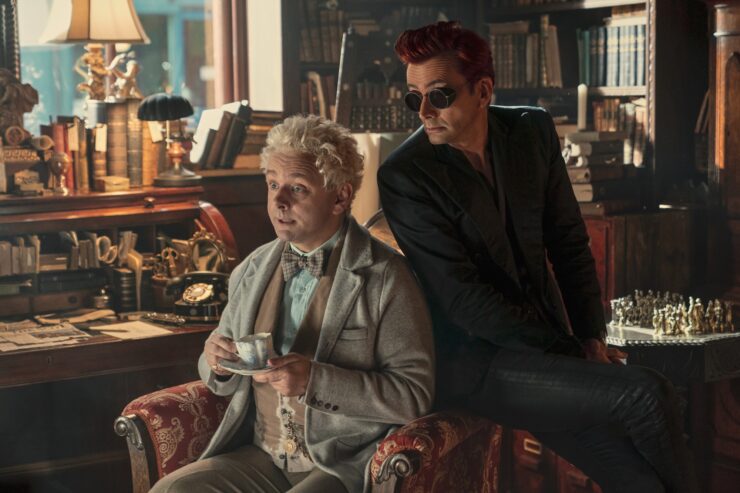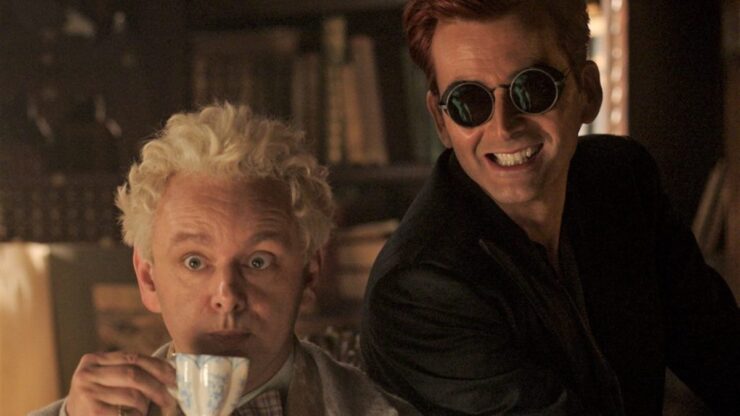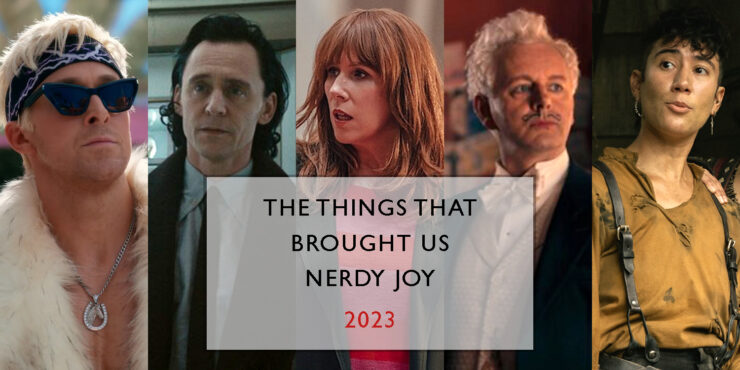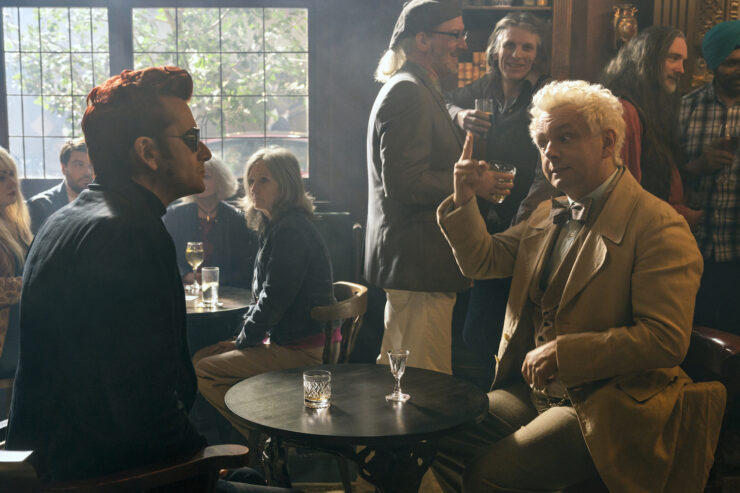Stories are transformed by their telling.
This is a fact that some people realize and others do not (or even actively resist), but it is fundamental to our appreciation of art. And while it seems a very simple thought, it happens to be infinitely complex in how this trick of consciousness acts upon what we create, what we believe, what we feel by absorbing the art all around us. We are told a story, and our unique experiences, our person-ness, translate that story according to our own implicit biases, thoughts, and desires into something entirely new.
And that is where I must begin before I can talk about the second season of Good Omens.
Oh, I’ve reviewed the season as a critic, I will continue to talk about it online and in circles of friends, and I will ponder it long after these conversations have died down. That’s how I experience most of the stories I adore—cyclically, eternally, obsessively, always looking for little niches I neglected the last time around and picking at the carpet corners to discover the old flooring underneath. There’s nothing particularly special about that within the liminal space known as “fandom.” We’re all here because we do that, in one way or another.
But there’s something different happening here. Something new that I need to place my finger on and mark in order to make sense of it. So maybe you could follow me while I tell you a story.
Of course, you’ll change it in the telling. That’s your job.
Good Omens was a story I loved, but it was also a space I needed, when I was young. Up until the release of the series, the book had a smaller but fiercely devoted fandom, and I lurked (to use the demonic terminology) for quite some time there before getting involved. The community, such as it I found it, was full of remarkably creative people, many of whom had a love of history, philosophy, and literature that far exceeded my own sprawl of knowledge. That was how I preferred to learn in those days—amongst people who generally treated me as an anonymous equal, encouraged my obsessions, and were quick to share any number of tips, texts, and extra eyes in the service of another work of fanfiction.
The majority of us had one key factor in common, of course: We were all certain that Crowley and Aziraphale were desperately in love with each other.
In those days, it was a quirk of the fandom that authors Neil Gaiman and Terry Pratchett knew perfectly well. And it seemed to be taken with good humor, at least, rather than the strange hostility some creators lob toward fans whose “interpretations” don’t align precisely with their gospel. This is in keeping with the themes of both authors’ works, but particularly of Pratchett’s in my mind: Stories change in the telling. As the final words of The Last Hero are written—“No one remembers the singer. The song remains.”
There were rumors, endless rumors in those days, that Good Omens would be adapted into a film. There were names attached and discarded at the speed of sound. Robin Williams would play Aziraphale. Johnny Depp would play Crowley. Terry Gilliam would direct. Strike that, replace names, start over. There was a script that Gaiman wrote for a Hollywood treatment that never came to pass. (I think most of us read it?) The idea of a film eventually grew to be a joke, a thing no one believed would ever come to fruition, and perhaps it was safer that way. Better no adaptation than something warped beyond recognition.
Pratchett told the world of the embuggerance. Both authors hinted that they’d sketched out a sequel for the book, though neither of them had the time just yet to sit down and write it. Eventually there was a set of New Year’s Resolutions from Crowley and Aziraphale, the first new piece of Good Omens story in ages. By this point, I was in college and had already introduced the book to my best friend who would become my partner. (He agreed that Aziraphale and Crowley were madly in love, of course, and beta read several of my fanfics.)
Life pressed on ahead, or maybe it warped beneath me. Fandom departed Livejournal for Tumblr and Twitter, and I started collecting bills that needed paying, which meant having some sort of steady job-type-thing. My partner and I, two cocktails in at a speakeasy, admitted that we would both very much like to get married. Soon after that, DOMA was overturned, which was a relief—but we would have gone through with it regardless. Whatever a church or a government thought made very little difference to us, aside from those piddly little human rights protections, of course.
Our wedding bouquets were flowers assembled from the pages of Good Omens, and an astronomer’s atlas.
I keep meaning to coat them in Mod Podge to preserve them, but am admittedly terrible at completing home projects. (Ask the unassembled, much-needed bookcase leaning forlorn against the wall in my apartment’s hallway.) But it felt right to have some piece of the story there with us, pressed between our hands, as we promised to look after one another forever. Aziraphale and Crowley certainly had, whether they meant to or not.
The world lost Pratchett the next year. This is the part where story comes in, you see, because it sounds like all of these things are connected, when they’re not at all. A tidy arc of events leading us somewhere, which we’re even more liable to attach to moments that are final or enduring. Marriage. Death. Given how interconnected love and grief are, this is perhaps more sensible than I’m giving it credit for. But the arc is meant to lead us somewhere, in this case, to the eventual announcement that Good Omens would be made into a television series, following a posthumous note Pratchett had delivered to his friend and coauthor, telling him to keep going and get the thing made.
The year before its release, my partner and I decided it was time to try our hands at Crowley and Aziraphale cosplay for Halloween. It was a big hit at the office, though we didn’t manage to film our own version of their drunken conversation about dolphins and mountains and musicals and godfatherhood, and I’ll always be sad about that.
I knew audiences would enjoy the show. What I didn’t anticipate were changes that rendered a certain relationship between one angel and one demon in a light far more attuned to the writings of my teenage self. The cues were all there, though no one said the word “love”—longing stares, swelling music, ages of pining, a break up at the end of the world. It was done with such clarity, my word, it was, but we don’t really live in a day and age that wants “crystal clear but soft around the edges.” We can’t afford it, can we? Everything must be stated out loud with vehemence, else someone can deny it. And they will, vocally, angrily, and with an eye toward removing a few more of those pesky human rights I mentioned from before.
Good Omens the series, being the first season, showed us that Crowley and Aziraphale loved each other—but it wasn’t enough.
And that sounds mad to me, as I’m saying it, because I’d never been allotted even a sliver of this previously in the things that I loved. Some folks get flippant about that line of thinking because we’re finally starting to see a flick of the dials, in terms of representation in more mainstreamed media. (And it’s not as though queer artists don’t create prolifically regardless.) There is more to be had now, and of course I’m grateful for it. But none of that changes the fact that most of my formative texts, the ones that molded my brain into the current shape I use day in and out, generally didn’t make room for me. I had to make that room myself, with others who wanted that same room. And contrary to certain very narrow opinions, that place wasn’t pathetic or delusional.
It was glorious. It was endlessly strange and it was mine.
I don’t know what changed in the process of taking Good Omens from novel to television series, from one season to the next, but I have a sneaking suspicion of the factors involved: A fandom that exploded with ever more queer kids and odd ones who felt seen and loved in that same space; the constant legislation against queerness, transness, disability, and healthcare; a global pandemic that isolated us from one another. Those are the big ones, but there are smaller ones at play, too: actors who were more than happy to play those roles and those stories; the increasing homogenization of blockbuster media providing a backdrop to counteract; an ugly surge from groups who tried to insist that one of the book’s authors was against trans rights.
Some might look at season two of Good Omens and say “That’s fan service right there.” But, you know—everything is fan service to someone. What they’re complaining about is this particular type of fan service not being their cup of cocoa. And sure, there’s another conversation to be had about what it means to tailor a story to its primary audience. But that’s a discussion that requires far more nuance and thought than a banner statement over whether or not something should be gay.
Truth is, I think most characters are queer because that’s my experiential baseline. And I know that some of those characters are more likely to be, “in actuality,” of course. I also know that the world, for most of my life, had no interest in obliging what I perceived in stories. And that it’s not wrong to want obliging just because there are more options now reflecting the sort of lives that I once looked for and rarely found.
There’s something precious in seeing what other people might not see. It deserves confirmation, construction, the tenderness of depiction—at least some of the time.
At least once.
I’m not sure I believe it happened, even now. That I watched season two and Crowley managed to say in words that “our side” was far more than a work agreement or a friendly contract. That he kissed Aziraphale right on the mouth, and we all saw it. That it’s real and irrevocable. That a story about a botched Apocalypse is morphing into a tale about how we cannot place our sacred trust in institutions (even celestial ones), only in the people who love us. I’m not sure I believe that it’s happening. But I always knew it, you see.
And this feeling of watching it come to life when it wasn’t remotely plausible even ten years ago… I’m not sure I have words to describe it. I imagine it’s close to one of those eureka moments that scientists are supposed to have. When inspiration coalesces into something infinitely more divine and a couple pieces of the universe puzzle snap together to give us a fragment of what we’re missing.
Stories change in the telling.
But they’ve never changed like this, not for me. And if that’s possible when I was so certain it would never be, then maybe there’s a little more possibility to go around. Everywhere.
Every day…
Emmet Asher-Perrin would write some fix-it fanfic for this season, but all the fix-it in the world isn’t going to help this level of heartbreak. You can bug them on Twitter and Bluesky, and read more of their work here and elsewhere.













